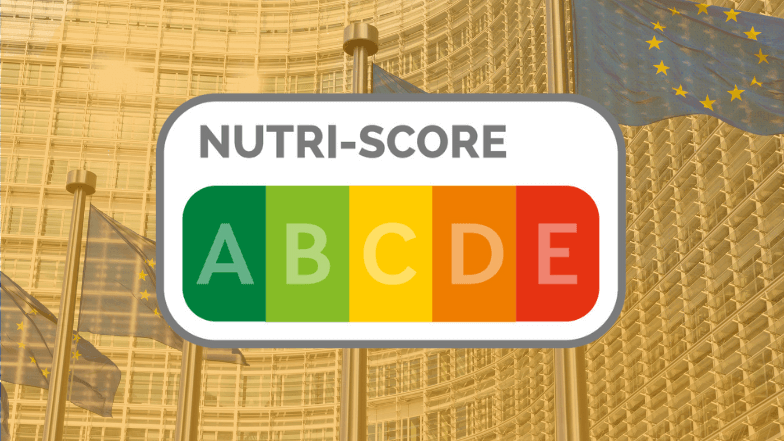Since December 2022, the European Commission has gradually buried the revision of the European regulation on consumer information. This regulation was supposed to propose a mandatory and harmonised front-of-pack nutritional label (FOPNL) in all Member States. Behind the scenes of the political debates, lobbies manoeuvred to sink the proposal, out of fear that the FOPNL proposed could be the Nutri-Score.
But they were not counting on foodwatch, who does not give up so easily. We demanded that the European Commission justify the failure to revise the regulation and made a request to the European Commission to obtain documents shedding light on this story. The so-called ‘Nutri-Score papers’ revealed the intense lobbying by the agri-business to prevent the introduction of a mandatory front-of-pack nutritional label.
The waiting game
In December 2022, foodwatch was eagerly awaiting the arrival of the Food Information to Consumers package which would include the proposal for a harmonised and mandatory front of pack nutritional label (FOPNL) for the EU (European Union).
It did not arrive. The whole package was removed from the agenda of the European Commission, arguing that more impact assessments were needed, and it has never appeared again in an annual work programme. When asked directly, the Commission has evaded questions and avoided explanations.
foodwatch contacted Ms Roser Domenach Amado, then acting-Director in the DG Sante’s One Health directorate in January 2023 to ask for a meeting to explain the situation and we were informed that:
Unfortunately, Ms Domenech’s agenda is very busy in the coming weeks, including commitments out of Brussels. We will come back to you with a proposal for dates when we will have a clearer view about her availabilities.
A follow-up request in February 2023 was not even answered. For that reason, we decided to launch an access to documents [1] request to understand whether if it was as difficult for other organisations to get a meeting.
The first request was launched in May 2023 and the results of it has been well documented. We used the Ask the EU portal, an online platform for citizens to send access to documents requests directly to EU institutions. That way, all of documentation received is accessible to the public. This has meant that other organisations and several news channels have also reported on the foodwatch request.
Nutri Score papers
In the documents that were released, evidence of meetings between the food industry and the highest level of the European Commission are documented.
Even if DG Sante could not meet with foodwatch, they did manage to meet with 17 food and drink associations. However, it seems that DG AGRI were the main target of the anti-FOPNL lobbying, with even the Italian Ambassador meeting the Cabinet of Commissioner Wojciechowski.
A request for a meeting in October 2022 from the Italian Permanent Representation and Federalimentare (the Italian Federation of Food Industries) together, resulted in a meeting just three weeks later with the Head of Cabinet in DG AGRI.
The meeting took place on 27th October and the minutes show that the argumentation is not based on scientific facts. The notes of the meeting say that: “There is unanimity in Italy against a system like Nutri-Score... [and] No scientific evidence supports Nutri-Score and consumers may eat higher quantities of products with a green score but low nutritional benefit.” They add that: “It is not useful for consumers and will have a negative social and economic impact,” and call on the agriculture Commissioner who has “an important role to play in this file.”
The scientific evidence and usefulness to consumers of Nutri-Score has been studied for years and the overview is well documented in this report written by scientists and health professionals.
Another meeting took place the following day with DG AGRI staff. Similar arguments were put forward: “In Italy, government, industry and farmers are all opposed to Nutri-Score... This is clearly a red line for the Italian government.” and again outlining the lack of scientific evidence. Here they add in that the Nutrinform logo could be a good approach.
AGRI conceded that the file us “more complicated than initially anticipated” and hints at the likelihood of delays to the first trimester of 2023.
However just days later the Head of Cabinet of Commissioner Wojciechowski wrote to the Head of Cabinet of Commissioner Kyriakides outlining a number of key points for the FOPNL. He refers to a preference for “Option 2 in the Impact Assessment”, i.e. not the Nutri-Score.
As the Food Consumers Legislation was still not on the table, and there were still several gaps in understanding what had happened, foodwatch submitted a second access to documents request to get hold of the impact assessments on 7th September 2023. We also made an appeal to get the minutes of the Regulatory Scrutiny Board which is the body which meets, in complete opacity, to decide whether a piece of legislation is ready to go out or not.
To date, access to all of these documents has been denied. The long letters of the Commission on the two cases (available here – excuse them for the wrong date to the initial application which was 8/5/23 and not 19/10/22 and here) explain why they think we should not see the documents.
Appeal to the European Ombudsman
The Commission is arguing that publicising these documents at this stage will ‘undermine the institutions decision making process’ and that there is ‘no overriding public interest to do so’.
We disagree:
France began with the Nutri-Score in 2017 and over the following years there was a clear momentum of countries joining: Belgium, Luxembourg, Spain, Germany, as well as many supermarkets.

The Commission is doubly responsible in both stopping countries from putting in place a measure that is proven to help with the non-communicable disease health crisis and failing to produce the legislation for a harmonised label.Head of the Brussels office for foodwatch
foodwatch has appealed to the European Ombudsman. The European Ombudsman looks into mal-administration in the European institutions and in this case will ask the Commission if they can see the requested documents and will give their opinion on whether they are correct in with-holding them or not - the case is ongoing. foodwatch believes that people have a right to know who is influencing the decision-making process and hopes that the European Ombudsman will also decide that too.
